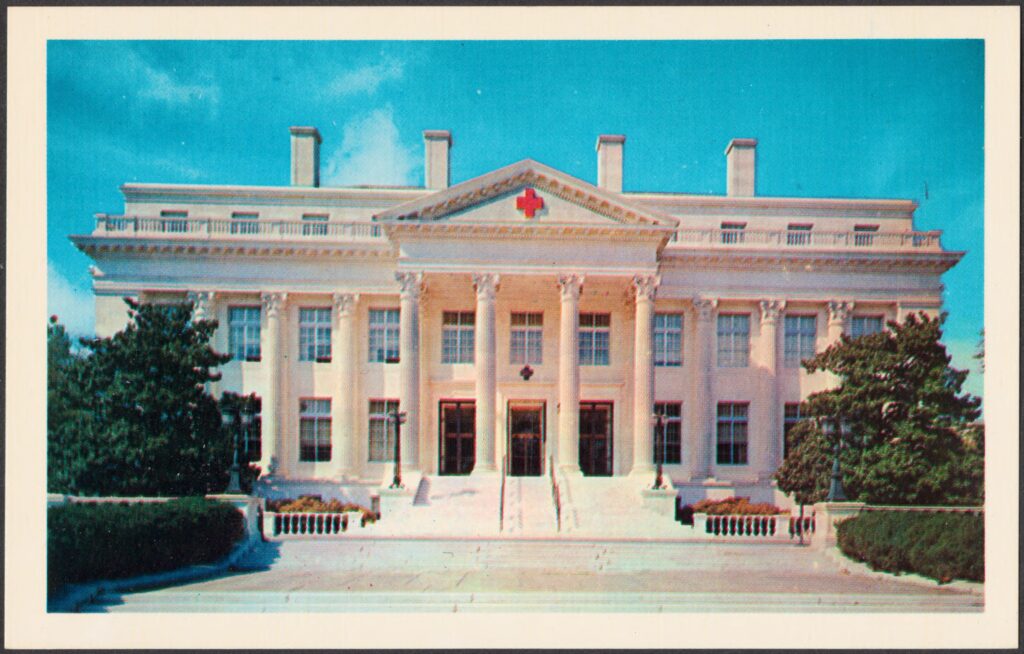International Committee of the Red Cross

Credit: Capsco Inc.
Licence: No known copyright restrictions. No known restrictions on use. (Source: Digital Commonwealth, Boston Public Library.)
[ca. 1960–1979]
| Giver: | Registered Organization |
|---|---|
| Receiver: | Individual or unstructured/informal group |
| Gift: | Other |
| Approach: | Philanthropy |
| Issues: | 10. Reduced Inequalities |
| Included in: | Humanitarianism & Philanthropy |
The International Committee of the Red Cross (ICRC) is a global humanitarian organization that coordinates relief efforts for people impacted by war, natural disasters and other crises. Founded in Geneva in 1863, the ICRC originally focused on providing medical care for wounded combatants, before gradually expanding its mission to include the protection of prisoners of war, civilians and refugees. The ICRC has also played a key role in developing the Geneva Conventions, an international legal framework that offers protection to both combatants and civilians.
The idea for the ICRC was inspired by Swiss businessman Henri Dunant. In 1859, Dunant had helped tend to French and Austrian casualties during the Battle of Solferino, a clash that left nearly 40,000 soldiers dead or wounded. Dunant’s experiences inspired his influential work Un Souvenir de Solferino (1862), a proposal for coordinating wartime relief on an international scale.
To garner support for his plan, Dunant created a five-person committee through the Société genevoise d’utilité publique (Geneva Public Welfare Society). In October 1863, the Swiss government hosted a conference of 16 nations to discuss a more systematic approach to delivering humanitarian aid in wartime. The ensuing agreement resulted in the formation of the ICRC. As a sign of its commitment to all combatants, the ICRC pledged to maintain strict neutrality, regardless of how a conflict was initiated. The organization’s ethos of nonintervention was embodied in its emblem: a red cross against a white background.
The conference participants also authorized the creation of national units to provide emergency care on the battlefield, which became the basis of Red Cross Societies throughout the world. In Islamic countries, these relief groups became known as Red Crescent Societies. While these national organizations were self-managing, the ICRC guided their efforts and supplied operational support.
In 1864, partners to the ICRC mission formulated the first Geneva Convention, the first international law to define universal guidelines for the treatment of injured combatants. Originally adopted by 12 nations, the convention was eventually ratified by countries across the world. In the ensuing decades, the ICRC established new conventions requiring the humane treatment of maritime combatants, soldiers captured in battle and civilians.
Red Cross efforts proved crucial during World War I, as the national societies mobilized ambulance teams to battlefields across Europe. In the aftermath of the conflict, these societies came together to create the League of Red Cross Societies (later the International Federation of Red Cross and Red Crescent Societies, or IFRC) to more effectively organize their work. THE ICRC and IFRC continued to deliver critical relief during World War II and subsequent global conflicts.
Today, the ICRC conducts humanitarian work in more than 190 countries. In addition to its activities in the field, the organization continues to lobby to expand legal protections for individuals impacted by conflict. Through its commitment to assisting all people, regardless of nationality or political allegiance, the ICRC has helped set a high international standard for philanthropic intervention.
Contributors: Maha Tazi, Stephen Meyer
| Source type | Full citation | Link (DOI or URL) |
|---|---|---|
| Publication |
Anderson, Chandler P. “The International Red Cross Organization”. The American Journal of International Law 14, no. 1/2 (1920): 210–14. |
https://doi.org/10.2307/2187844. |
| Publication |
Donini, Antonio. “Humanitarianism in the 21st Century”. Humanitaire. Enjeux, pratiques, débats, no. 25 (2010). |
http://journals.openedition.org/humanitaire/771. |
| Publication |
Dromi, Shai M. Above the fray : the Red Cross and the making of the humanitarian NGO sector. University of Chicago Press, 2020. |
- |
| Publication |
Dunant, Henry, American National Red Cross, and District of Columbia Chapter. A Memory of Solferino. American National Red Cross, 1959. |
- |
| Book |
Anderson, Uwe, and Katharina Behmer. “The Governance of Humanitarian Action in World Politics”. In International Humanitarian Action. Springer International Publishing AG, 2018. |
- |